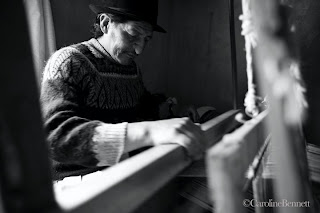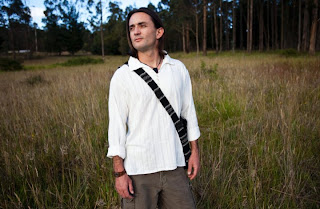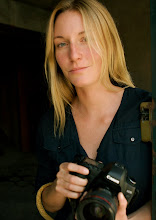26 June 2010
Inti Raymi: Summer Solstice on the Equator
Los Juanitos in Calera village preparing for the "Taking of the Plaza" in Cotacachi
"If there aren't at least two dead by sun down, it wasn't worthwhile this year." (from Cotacachi community member as villagers faced off in traditional dance/stone throwing & whipping, just before the policia went nuts with tear gas)
21 June 2010
¡Viva la Republica!
16 June 2010
Making Panela
Panela is an unrefined food product, typical in Ecuador and South America. It's basically a solid piece of pure sucrose obtained from the boiling, evaporation and cooling of sugarcane.
Fresh hot Panela is molded into solid cubes at a family farm in Nanegal, Ecuador.
Fresh hot Panela is molded into solid cubes at a family farm in Nanegal, Ecuador.
10 June 2010
Behind Café Veléz
A visit to Nanegal, where Ecuador's Café Veléz grows & purchases select coffee beans. Tried a special limited edition boutique roast from la Doña Magda's farm La Perla Negra- perhaps the best cafecito I've tasted in Ecuador! We're hoping she & Veléz will join Little Places as an exclusive feature product in this fall's Story Baskets!
06 June 2010
Oil in the Amazon
"BP’s calamitous behavior in the Gulf of Mexico is the big oil story of the moment. But for many years, indigenous people from a formerly pristine region of the Amazon rainforest in Ecuador have been trying to get relief from an American company, Texaco (which later merged with Chevron), for what has been described as the largest oil-related environmental catastrophe ever."

“As horrible as the gulf spill has been, what happened in the Amazon was worse.” NYT Op-Ed
For over four decades indigenous peoples of the Ecuadorean Amazon have witnessed multinational oil companies devastate their ancestral lands in search of petroleum. While drilling from 1964-1990, Texaco- currently owned by Chevron Corporation- is said to have dumped more than 18 million gallons of toxic wastewater, and spilled nearly 17 million gallons of crude oil, left hazardous waste in countless open pits dug out of the rainforest. The result is one of the worst environmental disasters known on the planet, with obvious lingering contamination of soil, groundwater, air and streams that has caused severe health problems in local people for decades. According to Amnesty International and as set forth in the International Covenant on Economic, Social and Cultural Rights, their basic rights to a standard of health, adequate standard of living and to water and sanitation have been and continue to be gravely violated.
See more at www.carolinebennett.com
New Project! LittlePlaces.org

Fair Trade, Fair Story.
Unique, handmade designs from far-flung corners of our planet; the stories 'stuff' is made of. Socially conscious, Earth happy, Sexy too. Littleplaces.org, original prints & special preview orders to come in July...


After years of working with communities as a photojournalist, I have decided to go a step beyond and become involved. I am creating something different, innovative and exciting: Little Places. The mission of Little Places is to tell the story of peoples and their communities- the issues and triumphs they face- through their products. LP seeks to provide a market for socially just, hand-crafted, environmentally conscious, high quality, unique products created in fascinating and often forgotten nooks of the planet.
Little Places Story Seekers are professional journalists who already know the communities from which goods come from well. They live in or go into places that produce products to create a photo/multimedia documentary telling the story of the people and region they were made in. How was this bag made? Why are the women of this Amazonian village making a seed necklace? How does this item represent the cultural traditions of the region and its peoples? What do the Amazonian women do when they aren’t making a necklace, how are they working to maintain traditional culture, what issues do their families face? Little places links the products and in-depth stories about producers and the regions they live in.
Little Places will first introduce communities in Ecuador, where I’ve lived and worked for over three years. Currently, I’m working with an indigenous Quichua family high in the Andes who make stunning jewelry out of natural local materials and have participated in a decades-long fight against miners. A group of Colombian refugees displaced by the paramilitary who are now designing fashionable eco-friendly handbags. A Kichwa women’s collective deep in the Amazon who have taken traditional concepts and merged them into sleek modern designs. A cooperative of indigenous Shaur who provide plant bases found only deep in the jungle for luxurious soaps and massage oils. Cacao, coffee and Guayusa tea producers who are challenging traditional agricultural practices; and independent artisans throughout Ecuador.
Eventually I hope to bring the project full circle to form a unique platform for the exchange of both goods and ideas, with physical locations in the US that include interactive gallery/store/café hubs that serve as both a marketplace and interactive platform for intercultural exchange. This could include: a “modern day pen-pal” network, where fifth graders deep in the Amazon set Skype dates with fifth graders in the Bay Area; hip world culture nights featuring global dinners & documentaries from the regions where products are produced; and trips to the far-flung and fascinating regions where goods come from. Profits will fund projects in the represented regions, and push for sustainable "sister community" relations. Little Places seeks to be a node of convergence, a platform for the “stories good stuff is made of,” and a voice for producers of nature friendly, socially just goods who through their work show it is not necessary to sacrifice ethics for quality and style.
"There is no use trying, said Alice; one can't believe impossible things. I dare say you haven't had much practice, said the Queen. When I was your age, I always did it for half an hour a day. Why, sometimes I've believed as many as six impossible things before breakfast."
Featured NGO Work: ChildFund Ecuador
Caroline specializes in humanitarian photojournalism, with a focus on documenting the development and conservation work of NGOs in Latin America and worldwide.
“I strive for a balance in my work that is both grounded in ethical photojournalism and inspires a call to action through high-impact visual storytelling founded in truth and dignity of the people represented. I seek not only to inform and reveal important stories that may otherwise go untold, but also to reveal our commonalities as human beings, despite geographical location or situation in this world that we share…to spark empathy and the desire to become involved and take action.”
ChildFund International is inspired and driven by the potential that is inherent in all children; the potential not only to survive but to thrive, to become leaders who bring positive change for those around them. ChildFund works in 31 countries, assisting approximately 15.2 million children and their family members, regardless of race, creed or gender. Their distinctive approach focuses on working with children throughout their journey from birth to young adulthood, as well as with families, local organizations and communities globally to create the environments children need to thrive.
“I strive for a balance in my work that is both grounded in ethical photojournalism and inspires a call to action through high-impact visual storytelling founded in truth and dignity of the people represented. I seek not only to inform and reveal important stories that may otherwise go untold, but also to reveal our commonalities as human beings, despite geographical location or situation in this world that we share…to spark empathy and the desire to become involved and take action.”
ChildFund International is inspired and driven by the potential that is inherent in all children; the potential not only to survive but to thrive, to become leaders who bring positive change for those around them. ChildFund works in 31 countries, assisting approximately 15.2 million children and their family members, regardless of race, creed or gender. Their distinctive approach focuses on working with children throughout their journey from birth to young adulthood, as well as with families, local organizations and communities globally to create the environments children need to thrive.
Subscribe to:
Posts (Atom)



















































